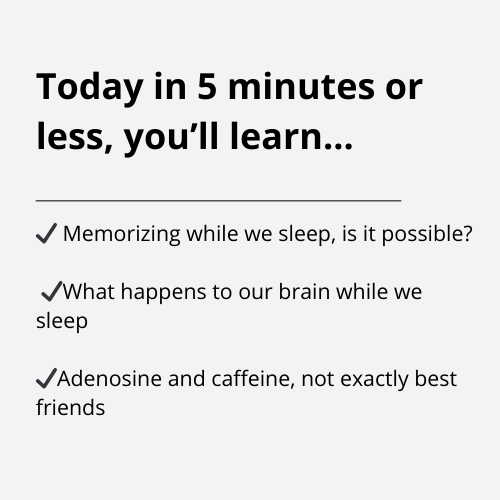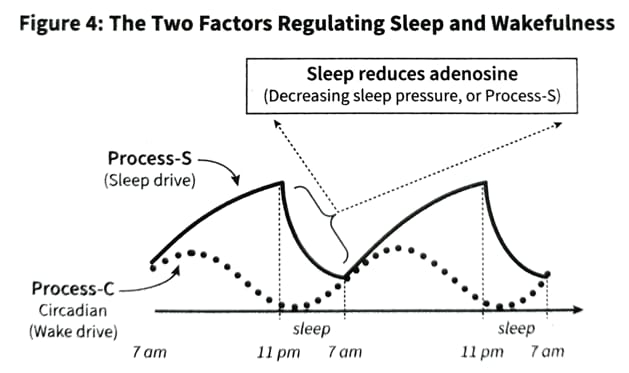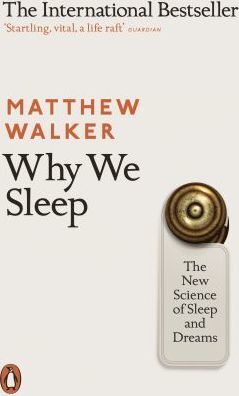- Verve Newsletter
- Posts
- The Sleep-Memory Connection: What You Need to Know
The Sleep-Memory Connection: What You Need to Know
Hello Enthusiastic of Knowledge!
Happy National Women's Day (two days late)
I know, it's Monday morning and you just wish you could be like this👇

Today you'll discover that you'd have all the reasons to do so.😉
I bet that at some point you've wished to learn while you slept. Like putting an audio on your phone and falling asleep, hoping to wake up in the morning with all the information you've heard, memorized.
It would be fantastic, I suppose, and no, I'm not about to reveal to you that it's possible. But something very similar exists.
Learning and sleep are closely related, and yes, technically you could say that you memorize while you sleep: let's see how.

Memorizing while we sleep, is it possible?
If you play a musical instrument, like me, you may have noticed this phenomenon.
When I used to study piano, I often found myself practicing a new piece in the evening. Even though it was still full of errors and imperfections, I would decide to go to sleep.
After a night's sleep, the next day, the same piece would surprisingly become easier. It almost seemed like the errors magically dissolved.
This phenomenon always intrigued me, but it wasn't until years later that I finally understood the reason, thanks to the bestseller "Why We Sleep: The New Science of Sleep and Dreams" by Matthew Walker.
In this bestseller, Matthew Walker summarizes and explains the results of years of scientific research on sleep, illustrating the stages of sleep and what happens to our brain while we sleep.
What happens to our brain while we sleep?
Do you know what happens to our brain while we sleep? It's amazing how much work our brain does during those seemingly silent hours. During sleep, our brain is actively engaged in memory consolidation processes, making sleep an essential ingredient for learning and memorization.
One of the most fascinating aspects concerns the role of sleep in information storage. During the stages of deep sleep and REM sleep (Rapid Eye Movements), our brain selects and strengthens the important information acquired during the day. Studies have shown that sleep promotes the formation of new synaptic connections in the brain.
In practice, during REM sleep, our brain moves information from short-term memory to long-term memory.
So, yes, you practically memorize while you sleep.
But it doesn't end there: during sleep, our brain replays the information learned during the day, creating a sort of "replay" of the experiences. This process not only helps to solidify memories but can also promote creativity and regulate emotions such as anxiety and irritability.
So, when I used to study piano, even though I appeared to be asleep, my brain continued to work silently to improve my musical performances, allowing me to play the piece with greater precision and fluidity the next day.
Sleep is a fundamental phase for learning, memorization, and processing, as well as for regulating anxiety and our emotions.
So, the next time you feel tempted to sacrifice sleep to stay up late, remember that you are depriving your brain of a precious opportunity to consolidate your experiences and learning.
❤️If you're curious, I highly recommend reading the book in question. It's truly a remarkable read. 👇
Adenosine and caffeine, not exactly best friends
I'll make a brief note on caffeine.
Let's be clear; I love coffee. But I realize how much of a difference it makes not to consume it, at least in terms of studying.
And here is why.
As explained in the book "Why We Sleep" by Matthew Walker, during the day, adenosine levels, a brain chemical involved in sleep regulation, gradually increase, signaling the approach of tiredness. When the adenosine level reaches its peak, we fall asleep. During sleep, our body "digests" adenosine by lowering its level again.
It's practically like a wave that rises and falls every day.

Caffeine has the ability to block the action of adenosine, delaying its accumulation and leading to a delay in feeling sleepy. By continuously delaying and accumulating adenosine without ever fully getting rid of it, we feel increasingly tired day after day.
Furthermore, the presence of caffeine reduces REM sleep stages, which, as we've seen, are our allies in memorization.
Essentially, we minimize the effectiveness of our efforts during the day to actively memorize!
I know, I also love coffee, and I don't deprive myself of it. But during certain periods, like exam sessions or more intense periods, doing a detox for a few weeks really boosts my energy.
If you're in a very stressful period, or if you simply want to optimize your performance, and you want to take care of your natural energy and improve the efficiency of your memorization, less coffee for you!
I'm with you, maybe soon.
Here is if you want to buy the Sleeping book, it’s worth it
What do you think about sleep and memory? Replay this email to let me know ❤️
Talk to you soon,
Isa

